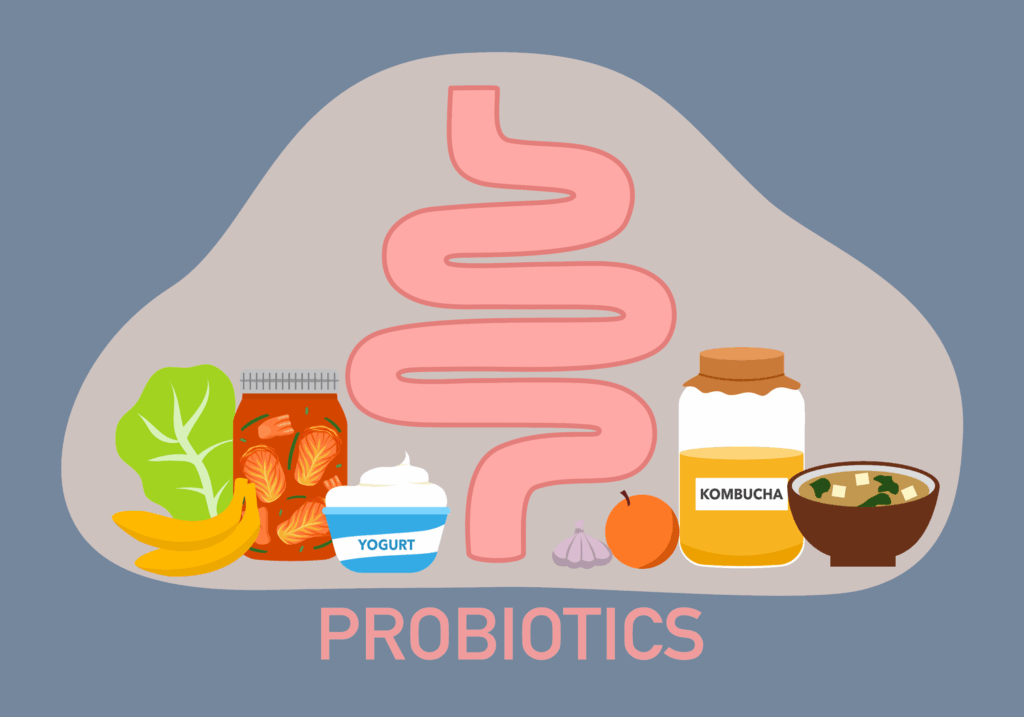Supplements have become increasingly popular with today’s focus on wellness, self-care, and preventative medicine. Although most supplements are not regulated by the U.S. Food & Drug Administration, probiotics have been found to offer a wide range of potential health benefits. Pottstown Regional Community Foundation (PRCF) offers insight on those benefits and how to maximize them.
Probiotics are healthy bacteria or yeast that help gastrointestinal (GI) function. They can be consumed through fermented foods like yogurt, kombucha, and sauerkraut as well as dietary supplements. These microorganisms may improve digestion or symptoms of certain illnesses. Research has shown a link between “gut health” in the intestines and overall general health. The gut shows promise as a central hub for everything from mood regulation to immune function—and, of course, stomach-specific issues like irritable bowel syndrome (IBS), gastrointestinal infections, and ulcerative colitis. Considering this, caring for the gut with the power of probiotics helps on many levels.
Top Benefits of Probiotics
Probiotics enhance the microorganisms that exist in the digestive track, often called the gut microbiome. By contributing to existing healthy bacteria, they support the body and mind in multiple ways.
For stomach and digestion, probiotics may perform multiple functions:
- Their presence leaves less room for harmful bacteria to line the intestines by increasing the beneficial microorganisms there.
- They produce antimicrobial substances, which defend against harmful microbes.
- They enhance the intestinal barrier to help prevent harmful pathogens from entering the bloodstream.
For immune function, probiotics may increase your ability to fight off infections.
- Probiotics also may reduce inflammation by regulating the body’s immune response.
- Up to 80% of our immune cells live in the gut. The balance of the gut microbiome affects both intestinal immunity and the body’s immune system overall.
For mental health support*, probiotics may improve the gut-brain axis, a communication pathway responsible for causing what we eat to possibly affect our mood and how we feel to potentially affect our gut.
- Imbalances in the gut contribute to the production of stress-inducing hormones that affect your mood.
- A weak intestinal lining may allow inflammatory substances to enter the blood where they may contribute to neuroinflammation in the brain.
- According to comprehensive studies, probiotics may improve mental health disorders like depression and anxiety; they also may help conditions like Alzheimer’s disease.
One Strain Does Not Fit All
Different strains of microorganisms benefit different areas of health. For example, probiotics shown as beneficial for mental health include specific strains of Lactobacillus and Bifidobacterium. Additionally, each individual has a unique gut microbiome, which is another reason their effectiveness varies.
Probiotics for Women
Certain probiotics target specific health concerns in women, including the ability to support vaginal and urinary tract health. Numerous brands cater to women’s probiotic needs, touting everything from menopause relief to weight management. Just like with all supplements, it is essential to do your own research to validate those claims.
Especially noteworthy, a higher culture count (e.g., advertised as “billions and billions”) does not always equate to increased effectiveness. This is particularly true for women’s probiotic needs. Often, the strain is just as important, or more so, than the amount.
A worthy women’s probiotic may offer all the previously mentioned benefits in addition to relief from:
- yeast infections
- urinary tract infections
- vaginal infections
- menstrual, perimenopause, and menopause discomforts
Choosing the Best Probiotics for Women
Look for a formula with at least 16 different types of strains. A variety of strains is crucial to meet women’s broad needs. Find a brand that also offers supporting ingredients like cranberry extract and D-Mannose for whole female health.
In general, probiotics stored in glass bottles have a better shelf life. Plastic storage allows moisture in the bottle, which can lower strain survival rates. Look for NSF International and GMP certifications on the bottle, which help ensure product safety.
Ask Questions
Although traditional medicine practice does not readily recommend supplements, many healthcare practitioners are willing to discuss these options for the benefit of their patients. Consider visiting an integrative physician who combines alternative treatments, including supplements, with conventional healthcare. A nutritionist or dietician also can help you establish a gut-friendly diet that meets your specific health needs.
Visit PRCF’s website for local resources and tips to help improve your diet. And, mark your calendars for the CHDC Community Health Fair on Friday, August 8! The Community Health & Dental Care center offers affordable healthcare to all ages and income levels in our community.
*Although probiotics have shown promise in improving mental health, it is important to consult with a healthcare practitioner before attempting to self-treat mental health illness and all other conditions. If you or a loved one are in crisis, call the Suicide & Crisis Lifeline: 988.





